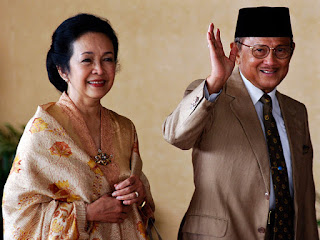B.J. HABIBIE
Bacharuddin Jusuf Habibie known as BJ. Habibie
was born on 25 June 1936. He was the Third President of the Republic of
Indonesia (1998-1999). Habibie was born in Parepare, South Sulawesi Province to
Alwi Abdul Jalil Habibie and R.A. Tuti Marini Puspowardojo. His father was an
agriculturist from Gorontalo of Bugis descent and his mother was a Javanese
noblewomen from Yogyakarta. His parents met while studying in Bogor. When he
was 14 years old, Habibie’s father died.
Following his father’s death, Habibie continued
his studies in Jakarta and then in 1955 moved to Germany. In 1960, Habibie
received a degree in engineering in Germany, giving him the little Diplom-Ingenieur. He remained in Germany
as a research assistant under Hans Ebner at the Lehrstuhlund Institut Fur
Leichtbau, RWTH Aachen to conduct research for his doctoral degree
In 1962, Habibie returned to Indonesia for
three months on sick leave. During this time, he was reacquainted with Hasri
Ainun, the daughter of R. Mohamad Besari. The two married on 12 May 1952,
returning to Germany shortly afterwards. Habibie and his wife settled in Aachen
for a short period before moving to Oberforstbach. In May 1963 they had their
first son, Ilham Akbar Habibie, and later another son, Thareq Kemal Habibie.
When Habibie’s minimum wage salary forced him
into part-time work, he found employment with the Automotive Marque Talbot,
where he became an advisor. Habibie worked on two projects which received
funding from Deutsche Bundesbahn. Due to his work with Makosh, the head of
train constructions offered his position to Habibie upon his retirement three
years later, but Habibie’s refused.
Habibie did accept a position with
Messerschmitt-Bolkow-Blohm in Hamburg. There, he developed theories on
thermodynamics, construction, and aerodynamics known as the Habibie Factor,
Habibie Theorem, and Habibie Method, respectively. He worked for Messerschmitt
on the development of the Airbus A-300B aircraft. In 1974, he was promoted to
vice president of the company.
In 1974, Suharto requested Habibie to return to
Indonesia as part of Suharto’s drive to develop the country. Habibie initially
served as a special assistant to Ibnu Sutowo, the CEO of the state oil company
Pertamina. Two years later, in 1976, Habibie was made Chief Executive Officer
of the new state-owned enterprise Industri Pesawat Terbang Nusantara (IPTN). In
1978, he was appointed as Minister of Research and Technology. Habibie was
elected vice president in March 1998. On 21 May 1998, Suharto publicly announced
his resignation and Habibie was immediately sworn in as president. Habibie’s
government stabilized the economy in the face of the Asian financial crisis and
chaos of the last few months of Suharto’s presidency.
Since relinquishing the presidency, Habibie has
spent more time in Germany than in Indonesia. However, he has also been active
as a presidensial adviser during Susilo Bambang Yudhoyono’s presidency. In
September 2006, he released a book called Detik-Detik
Yang Menentukan: Jalan Panjang Indonesia Menuju Demokrasi (Decisive
Moments: Indonesia’s Long Road Towards Demoncracy). The book recalled the
events of May 1998.
(Adapted from:
http://en.wikipedia.org/wiki/B._J._Habibie)

Komentar
Posting Komentar